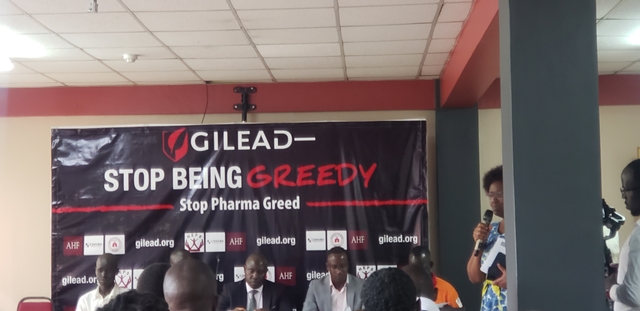Gilead under the spotlight as African CSO’s raise voices against greed by big-Pharma

A campaign Civil Society Organisations and the AIDS Healthcare Foundation (AHF) Uganda Care, against greed by big-pharma, has brought into sharp focus the unconventional tactics US biopharmaceutical giant Gilead Sciences, has been employing to maintain punishing monopolies that are keeping life-saving drugs for HIV and Hepatitis C out of reach of African patients, through exorbitant pricing.
AHF says the monopolies, maintained through ‘evergreening’, a technicality under which a drug originator is allowed new patents for incremental improvements to an existing treatment regimen, have allowed Gilead to maintain the price of a highly effective drug against hepatitis C at USD1,000 per pill, with a 12-week course of treatment retailing at of over USD 90,000 in the U.S. A generic formulation of the same drug costs only $4 per pill in India, but according to Médecins Sans Frontières, Gilead has excluded 50 middle-income countries from access to the generic, discounted price.
“Ugandans deserve access to affordable HIV and hepatitis C medications without being held hostage by Gilead’s greed, and we call upon the government of Uganda to join the advocacy against Gilead’s greed to ensure that life-saving medications are affordable and accessible to all who need them.” Says Kenneth Mwehonge, Executive Director, Coalition for Health Promotion and Social Development (HEPS).
For Africa, which has the highest HIV burden globally, access to Gilead’s formulae is important because its drugs are also better tolerated, having fewer incidents of adverse reactions among users.
“Gilead must be held accountable for arbitrarily placing a price on who lives and who dies by keeping the most effective, modern, and lifesaving medicines out of reach of millions of people in low- and middle-income countries,” said Moses Mulumba, Director General, of the CSO Afya na Haki during the launch of the campaign in Kampala April 12.
Gilead holds the patent on remdesivir in 70 countries worldwide, and there are no production sites for the drug outside the U.S. In the face of a huge demand for remdesivir, MSF says Gilead is taking advantage of the patent monopoly to limit access to the drug and prevent generic competition.
“Gilead has harmed people living with HIV worldwide for over 20 years by securing continual patents, known as ‘evergreening,’ and generating billions of dollars by creating a monopoly on some of the most effective and well-tolerated antiretroviral drugs to treat HIV,” said AHF Africa Bureau Chief Dr. Penninah Iutung.
Justifying their “greed” label against Gilead, the CSO’s cited the $27 billion in revenue and $19 million compensation that the company and its CEO earned in in 2021.
Africa needs access to cheaper versions of effective medication because amidst low incomes and a heavy debt burden, its HIV/AIDS response is dependent on international donor funding.
“Gilead is prioritizing profits over people’s health. In addition to overpricing its drugs, Gilead has consistently blocked attempts to introduce cheaper generic versions and refused to register some medications in lower-income countries, further intensifying the access barriers.
“As a leading global HIV/AIDS organization with over 1.7 million patients in care across 45 countries, including nearly 871,000 in 13 African countries, it is our responsibility at AHF to take a stand and call out Gilead so that governments – including the government of Uganda – and decision-makers everywhere put collective pressure on it to prioritize lives over obscenely high profits,” added. Dr. Iutung.
The CSO’s further observe that despite claims that it uses its profits to develop new drugs, Gilead all too often buys up publicly funded research on new medicines, brings them to market at inflated prices, and rewards its executives with enormous pay packages while delivering above-market stock prices and dividends for its shareholders.
Civil Society Organisations are now calling on Gilead to stop evergreening patents on existing HIV/AIDS drugs like Truvada, terming as exploitation rather than innovation. They also want the firm to pen the license for the generic production of the hepatitis C drug Harvoni to all low- and middle-income countries, without exception. The organisations also called on Gilead sell or license remdesivir for generic distribution at a nonprofit price during the Covid-19 pandemic phase, and license technology to produce treatment for cryptococcal meningitis to generic manufacturers.
“It is impossible for patients in low-and middle – income countries to access quality, new effective drugs without Gilead granting patent rights to generic drug manufactures,” says Henry Magala, Country Program Director Uganda Cares. The dwindling donor health funding and low domestic heath financing leaves no option for service providers in the treatment program than to use low-cost drugs often with side effects, observes Henry Magala.
Gilead is notorious for exploiting patent monopolies on blockbuster drugs to enrich itself and its shareholders. It uses R&D [research and development] costs as an excuse when those aspects are often funded by taxpayers. For their generosity, the public and lower-income countries are rewarded with astronomical drug prices. Our global advocacy campaign is meant to let everyone know about Gilead’s greedy tactics and make lifesaving medicines accessible for everyone, not just people in rich countries.”

 New leadership for bankers’ umbrella as total assets top $12 billion
New leadership for bankers’ umbrella as total assets top $12 billion
 Brussels Airlines to announce Nairobi service
Brussels Airlines to announce Nairobi service
 SITA promises enhanced travel experience after Materna acquisition
SITA promises enhanced travel experience after Materna acquisition
 Saudia’s 105 aircraft order stretches A320neo lead over rival Max
Saudia’s 105 aircraft order stretches A320neo lead over rival Max
 Kenya calls for speedy resolution of territorial and immigration disputes with Uganda at JMC
Kenya calls for speedy resolution of territorial and immigration disputes with Uganda at JMC
 Boeing refuses to pay hackers $200 million for stolen Data
Boeing refuses to pay hackers $200 million for stolen Data
